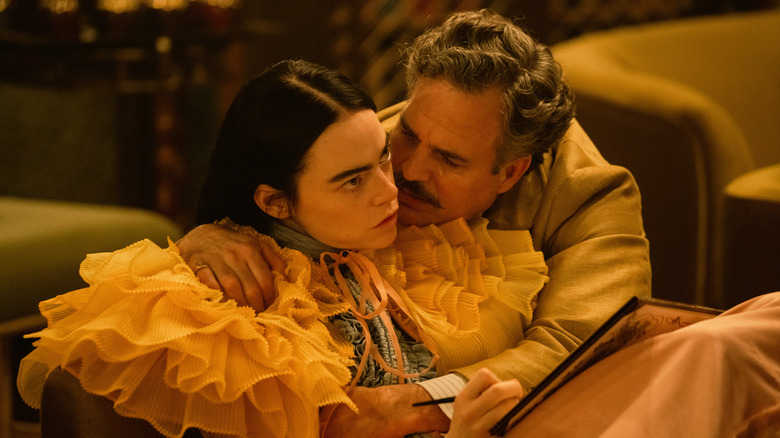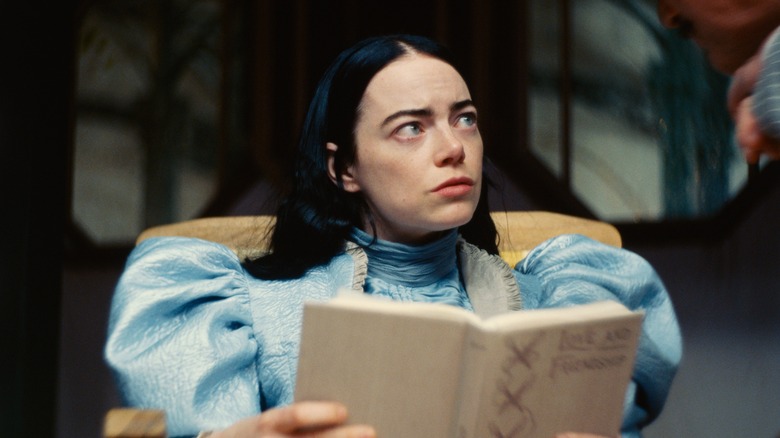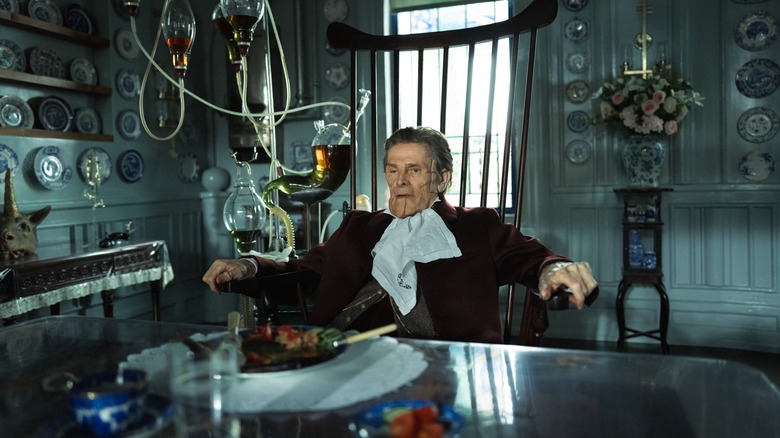Poor Things Review: Emma Stone Shines In A Bold, Beautiful, And Hilarious Frankenstein Riff
When Yorgos Lanthimos first crossed over into the mainstream with "Dogtooth" (or as mainstream as the art house gets), the thing that jumped out most about his films at first glance was the odd affect every single actor imbued their performance with, where they would speak as flatly as humanly possible. This same delivery carried over to his first two English language features, "The Lobster" and "The Killing of a Sacred Deer." It was an effective dramatic device, as it kept the audience on edge because they weren't sure if the next moment was going to be hilarious or horrifying. This deadpan delivery seemed to be Lanthimos' "thing," but that isn't really the case anymore. Starting with "The Favourite," penned by screenwriter Tony McNamara, Lanthimos has fully broken himself out of the stylistic confines of his cinematic beginnings into something far more baroque and wild.
Underneath whatever style Lanthimos employs, the thematic cores of his films all remain of a piece. He has always been interested in the construction of societal norms and showcasing just how absurd and dangerous these ingrained ideas are for every single person. "The Lobster" deconstructed how the world views love and relationships, while "Dogtooth" tore apart parenting and the nuclear family. Lanthimos wants to show you something you take for granted as a given and make you double — or even triple — guess it.
His latest film "Poor Things," also written by McNamara, acts as a culmination of this mission by looking at the world at a macro level and attempting to tackle so many different aspects of society. From the patriarchy to class to bodily autonomy to sex to marriage to family to so many other things, "Poor Things" is as ambitious as Lanthimos has ever been. And that ambition is just as extreme in style as it is in theme. The result ends up being one of his finest films, and quite possibly, the best film of the year.
A perfect protagonist for Lanthimos
Bella Baxter (Emma Stone) has been cloistered away from the world at the behest of her guardian Dr. Godwin Baxter (Willem Dafoe), whom she refers to as "God." You see, Bella isn't just a young woman. The doctor has reanimated the corpse of a pregnant woman who died by suicide, and the brain inside Bella's head is that of the woman's unborn fetus. When we meet Bella, her motor functions are iffy at best, her capacity for language minimal, and her relationship with polite society is nonexistent. Godwin has enlisted the assistance of medical student Max McCandles (Ramy Youssef) to monitor Bella's development at all hours of the day. As any person trapped would want, Bella longs to see the world, and the opportunity comes in the form of idiotic cad Duncan Wedderburn (Mark Ruffalo), who sets forth on a journey that brings them all around Europe.
Most of Lanthimos' protagonists understand the rules of their respective worlds, and their journeys typically involve them learning that they either need to break free of those rules or tragically succumb to them. Bella isn't like that at all. Because she has been locked away, she has no conception of what the world expects from her. She likes to eat, learn, and have a lot of sex, and she doesn't understand why the world would look down on a woman enjoying these things. After all, what's better than an orgasm? Why wouldn't you want to talk to random strangers about how often they have sex? Sure, behind closed doors people love engaging in these things, but we can't talk about it. Why? Well, polite society has deemed it so. Bella has lived a life free of shame, and she's all the happier for it. By centering on a character completely naïve to the world rather than someone too aware, Lanthimos can so quickly show you how farcical all of these norms are up front.
Though it might not have seemed totally obvious at the outset, Lanthimos has found a perfect collaborator in Emma Stone, whom he first linked up with on "The Favourite." To be a part of the world he creates, one does not just have to open themselves up to be completely emotionally vulnerable, but physically and vocally, you will be asked to do things that could be quite taxing, not to mention completely bizarre where you could so quickly lose sight of the overall vision. Stone is completely game for whatever Lanthimos throws at her, as she truly is a character actor through and through. "Poor Things" asks her to play everything from babbling and waddling around like a toddler to complete emotional devastation to speaking in vernacular and sentence fragments that no person has ever spoken with before. It's a bravura performance that doesn't contain a whiff of self-awareness or vanity. For someone who is already one of the most respected performers of her generation, "Poor Things" takes Emma Stone to a whole new level, which she conquers handily.
A vibrant, entirely unique world
The world that Bella Baxter sets forth into may have the names from our world — London, Paris, Lisbon, etc. — but it does not look like our world. Production designers Shona Heath and James Price have crafted something that has no one source of inspiration. Part of it draws from the look of the classic James Whale "Frankenstein" films, but there's also some futuristic steampunk in there, along with elements ranging from abstract expressionism to modernism to designs I couldn't even begin to describe. The buildings of these cities evoke their real-life counterparts, but you can't imagine buildings there looking like these. Rather than ordinary blue skies, swirls of different colors are what illuminate the day or night. Every single detail in every single room feels entirely handcrafted.
Shot on both color and black-and-white 35mm film by Robbie Ryan, Ryan and Lanthimos push even further the visual style they started developing there. The lenses get even wider, distorting faces and spaces even more, often even pulling out fisheye lenses to contain several different characters in a small space in the same shot, which also happens to be in the slightly more confined 1.66:1 aspect ratio. Having that marginally boxier frame works perfectly to simultaneously make it feel like the world is trying to confine Bella, but she has enough space to never stop thinking about expanding her horizons. Ryan also includes touches like completely warping the out-of-focus background of some scenes into beautiful kaleidoscopic images when Bella is able to encounter actual emotional honesty.
The outlandishness of the world is perfectly matched by the equally outlandish casting. In particular, Mark Ruffalo is operating on a comic level here that he — and few others in recent memory — has rarely been able to achieve. He's playing to the cheap seats, for sure, but every single word out of his mouth, every twitch of his head, and every begrudging smile had me cackling to the point where I wouldn't be surprised if the people sitting near me in the theater became a little annoyed with my laughter. His English accent isn't even that good, but all that does is add to the effectiveness of his foolishness.
Sometimes when filmmakers are afforded to operate on a grand scale, they can either crumble under the weight of their ambitions or simply not have the visual inventiveness to match the sweep of their story. With "Poor Things," Yorgos Lanthimos meets every challenge with aplomb. Nearly every single second feels perfectly calibrated in tone, theme, character, and scope. It tells a very classical story — not all that different in structure from things like "The Wizard of Oz" or "Star Wars" — but through the eyes of Lanthimos, it feels like nothing else. When I go to the movies, that's what I want to feel.
/Film Rating: 9.5 out of 10


